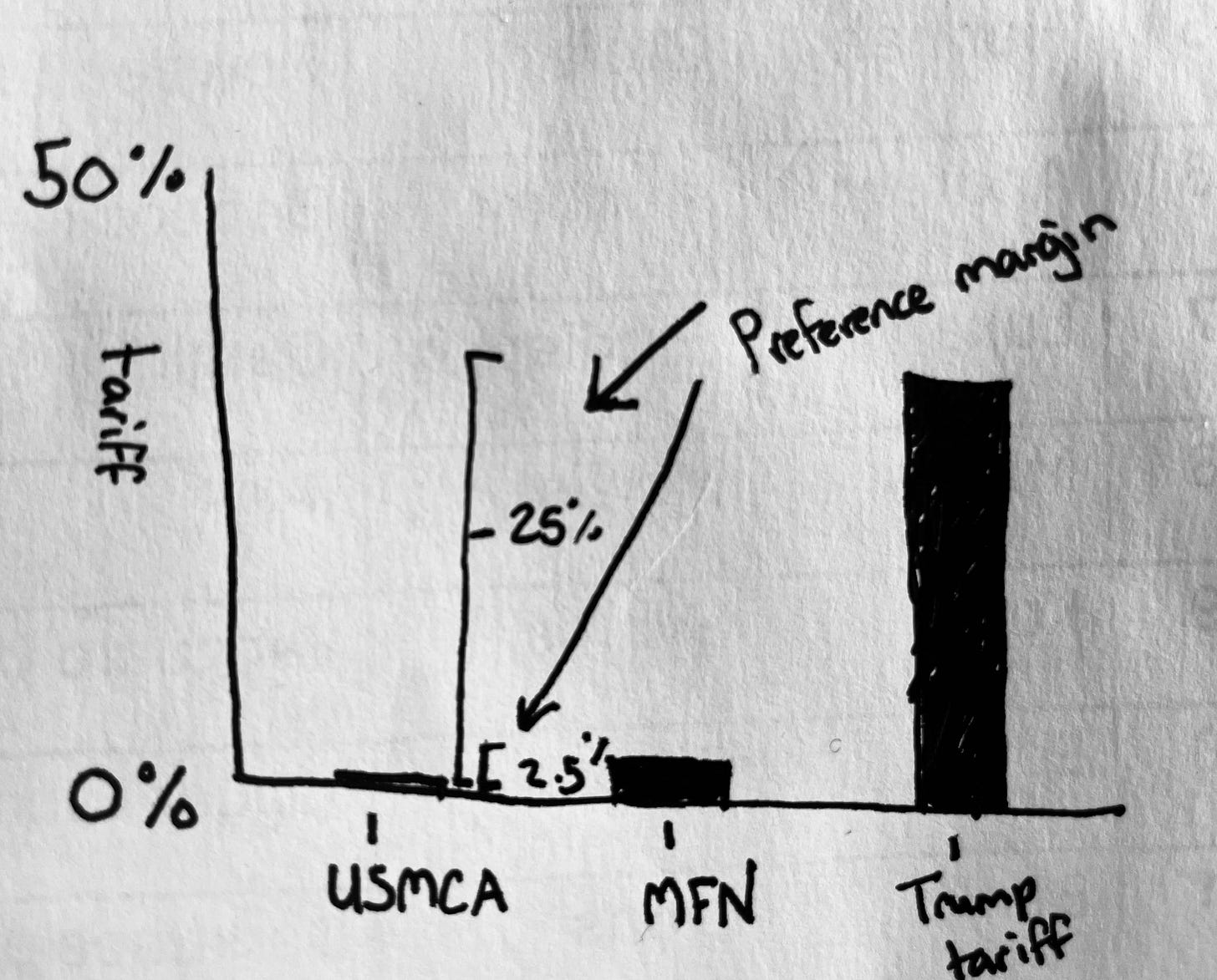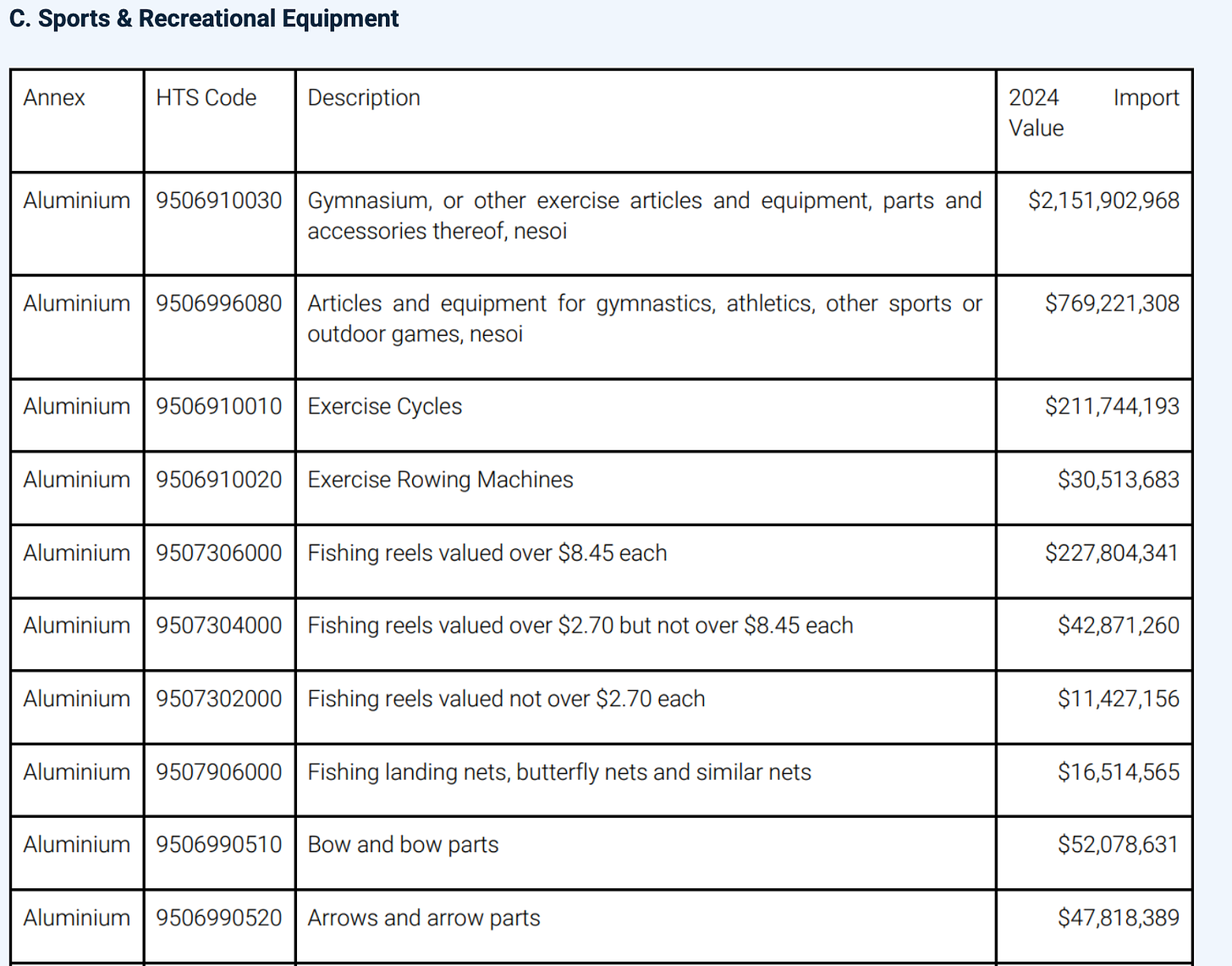In the hours before Trump imposed his 25 per cent tariff on Canada and Mexico, I posted this on Bluesky:
Then, yesterday, Trump announced a one month tariff reprieve for automakers which comply with the terms of the USMCA.
As per the Financial Times:
Leavitt added the exemption would apply to cars complying with the terms of the 2020 trade deal between the US, Mexico and Canada.
“The president is giving them an exemption for one month so they are not at an economic disadvantage,” Leavitt said.
A senior Trump administration official later said that the exemption would also apply to car parts that were compliant with the USMCA agreement. Parts account for the bulk of North American cross-border trade in the industry.
I know what you’re thinking. Yes, I’m a prophet.
But more importantly, this provides a good opportunity to slightly overthink the recent US trade actions.
Because last time around, when Trump renegotiated NAFTA and turned it into USMCA, he made the rules of origin criteria stricter, making it harder for Mexican and Canadian car exporters to avoid tariffs:
The USMCA ROOs for motor vehicles require a specific amount of North American content in the final vehicle in order to qualify for duty-free treatment under the USMCA. The USMCA raised regional value content (RVC) requirements to 75 percent for passenger vehicles and light trucks, compared to 62.5 percent under the NAFTA. In addition, certain “core parts” must also meet the higher RVC thresholds for the entire vehicle to qualify. The USMCA also requires that at least 70 percent of a vehicle producer’s steel and aluminum purchases originate in North America. Finally, the USMCA introduced a new LVC rule that requires that a certain percentage of each producer’s qualifying vehicles be produced by employees making an average of $16 per hour. Collectively, these new requirements are intended to incentivize increased investment in autos and automotive parts production within the United States and North America.
This is all designed to force companies to make their cars, and source their parts, in North America.
But for cars, at least, there is a problem: the preference margin is too low to incentivise behaviour change.
By this I mean that the 2.5 per cent MFN tariff applied on cars by the US is, at times, lower than the USMCA rules of origin compliance costs required to qualify for its 0 per cent tariff.
This means that if you are, for example, a Chinese OEM and want to dodge the US EV tariff of 102.5 per cent on direct exports from China, you could set up in Mexico, use Chinese parts, and sure, you won’t qualify for USMCA, but you’ve got a good chance of qualifying for the 2.5 per cent MFN tariff.
Buuuuuuut, this is absolutely not what Trump wants to happen. He wants firms to make stuff in the US.
So, what to do?
First, increase the preference margin by hiking the default tariff.
In infographic form:
This means that USMCA becomes much more attractive.
Next, and I expect this is coming as part of the wider USMCA review, tighten up the rules of origin even further.
For example, you could increase the RVC requirement to 90%, or you could insert new obligations relating to how much of the value has to be created in the US specifically. Compliance would be costly for firms, but if the alternative is a 25% tariff, it might still be the relatively more cost-efficient option.
Or at least, that’s what Trump/the US will hope.
Or maybe I’m overthinking things.
Trump tradewar timeline 2.0
Chad Bown is back, and his legendary trade war timeline has joined him. Check it out here.
Chart of the week
With thanks to George Pearkes over on Bluesky, firm evidence of US importers front-running new tariffs:
Steel and aluminium
Lest we forget, the next bit of tariff action is set to be on steel and aluminium, with a global US tariff set to come in on 12 March.
Global Trade Alert’s Simon Evenett and Johannes Fritz have very usefully dived into the impact this could have on the import of steel and aluminium derivatives.
You should read the piece HERE, but here’s the impact on fishing equipment and bows and arrows. American hunters will be pissed.
Other things
For those of you who like your trade analysis in podcast form, I had a long chat with Reuters’ Peter Thal Larsen about Trump and is tariffs. Listen HERE.
For those of you who dislike Man City, this (probably futile) attempt by La Liga to get the European Commission to use its foreign subisdies regulation to investigate the football club is funny.
Best,
Sam









